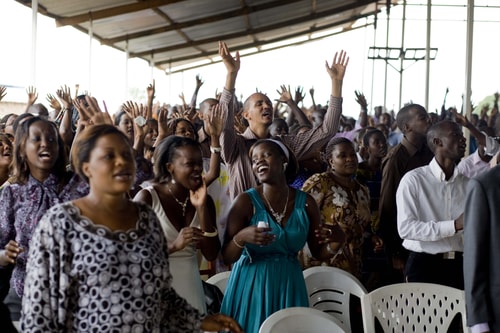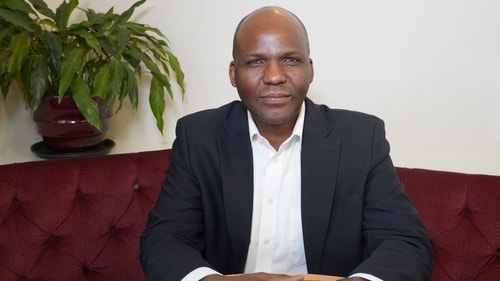Pastor Anderson Moyo started church plant Sheffield Community Church in 2004, but his missional journey started many years before that, 8,000 miles away, in his homeland of Zimbabwe...
Anderson grew up in a non-Christian family. Being raised in Africa, most of his childhood was characterised by interacting and living with a big extended family. He made the decision to follow Jesus when he was just 14 years old, but became a more committed Christian when he attended university.
“When I moved to Harare to attend university, I felt drawn to this one Pentecostal church because it was family-oriented, had a relevant ministry to students and emphasised discipleship as a priority in ministry. I was also attracted by the warmth of the people in the fellowship. They were authentic, real people that one could talk to me about ordinary and spiritual things without me feeling like a ‘fish out of water,’” says Anderson.
At this time his church was not involved with missions but he had become aware of missiology through his studies with an international theological institution which ignited his passion for evangelism.
Some time later he became a youth pastor and had an unwavering desire to reach people from diverse nations with the gospel and lead them into fully devoted followers of Christ.
During his time as a youth pastor in Zimbabwe, Anderson ministered to young people from more than 50 congregations nationally and supported students as part of a university chaplaincy team.
He later became instrumental in leading the missional vision of the church. “Along with the youth leadership team, we were responsible for developing youth leaders and their teams for the denomination, organising national youth camps and conferences,” recalls Anderson.

When asked, how are people coming to faith in Zimbabwe, and how it differs from the UK? Anderson said: “In Zimbabwe, people in general come to faith mainly through the relational approach of evangelism. People are more open to listen to those that they relate with about most things including their faith. Most people in Zimbabwe find it easier to share their faith primarily with those they know either through familial relations or work-related connections.
“There is an openness to the gospel because of the African worldview whose premise is the existence of a supreme being who created the world and governs all. The concept of religion and community consciousness is foundational to the African worldview.
“However, the UK context is much different in that its worldview; that God does not exist and therein lies the challenge for someone like me who grew up with a worldview that did not have to grapple with the question of whether God exists or not.”
"In Zimbabwe, people in general come to faith mainly through the relational approach of evangelism."
As a result of his experience with the nuances of evangelism in Zimbabwe and in the UK, I asked Anderson to highlight how his approach in the UK differs?
“My experience is that our sharing of the Christian faith in a place like the UK, we have to be apologetic in theological approach but abounding in love… The dire need for the evidence of God’s power cannot be understated in evangelism in the UK!
“Another issue at play in the UK that I have encountered is an individualistic culture that is centred on the individual. It is predominately analytical, factual and evidence-based.”
Anderson explains that although faith matters are logical and can be reasoned out, “they are also spiritually discerned, and this presents some profound difficulties in sharing our faith in the UK context”
"The dire need for the evidence of God’s power cannot be understated in evangelism in the UK!"
He goes on to acknowledge that whilst this is still a challenge in Zimbabwe, he has found it more prevalent in the UK missional context.
But explains that this is still exciting because there is scope within the UK missional field to build “relational bridges” with people, which in turn earns trust and forges friendships. These relationships create opportunities for natural discussion about life and faith, “just like friends would talk about anything!”
Anderson says, “It is with this in mind that I encourage both British churches and diaspora churches to initiate and participate in meaningful interaction across ethnic, cultural and racial lines. Followers of Christ are incarnational witnesses wherever they go.
“As the UK church, there’s also the challenge of navigating the historical and sociocultural context of the power dynamics that influence how people see others through the racial lens. Britain’s imperial legacy is defined by race but as Christians in the UK, we need to understand we are given a new ethnic identity that identifies us as “children of God” (John 1:12) who find their location in Christ (Romans 6:11) and identify themselves with one another as distinctly set apart by the agape love we have towards one another (John 13:34 – 35).”
With this in mind, it is clear that there are great challenges to understanding the complexities of relationships, community and culture within the UK and how to navigate this unique and nuanced missional field. But we can also marvel as Anderson does, at the vast opportunity to encounter those that have not yet heard the gospel but may be open to it and to engage them in relationship; appearing to God’s people as the church – full of kindness, generosity and compassion – as Jesus did. What an exciting time to be an evangelical!

Mission Possible: Evangelism in persecuted lands and how the UK church can be bolder
A powerful and inspirational account of Iranian evangelist Asrin, and her missional journey from Iran to Turkey



